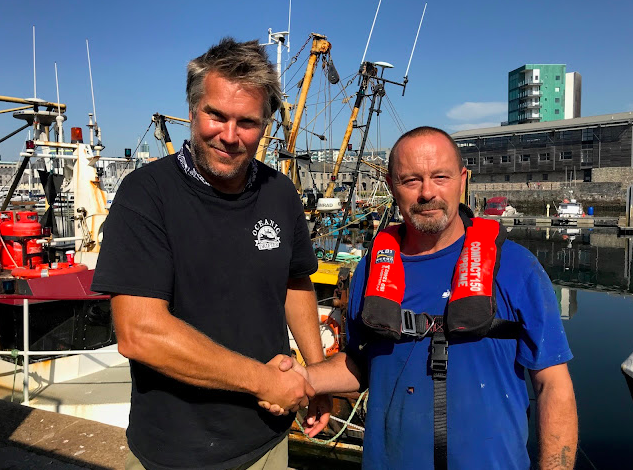Fisherman issues stark warning after overboard brush with death

A commercial fisherman has issued a simple but life-saving message to his fellow crewmen after he fell overboard: “A lifejacket and PLB [a locator beacon] saved my life, wear them.”
It had started out as an ordinary working day for Paul Reed who, ready for a day out at sea, had headed down to Plymouth Harbour to meet his captain. They both got on-board the Sidney Rose, and then set off for a normal day casting their nets.
There was nothing to suggest it was about to become one of the scariest – and fortunate – days of Reed’s life.
But the smallest of slips turned Reed’s ordinary day into an overboard ordeal that he only came through because of the smartest decision he has ever made, to grab his lifejacket – equipped with a Personal Locator Beacon (PLB) – before going out on deck.
If he had not, he most likely would not be here to tell his tale and urge fellow fishermen to don a lifejacket and carry a PLB.
Reed’s overboard ordeal took only 67 minutes but felt like a lifetime.
He says he tripped as he tried to reattach a loose connection and was unable to prevent himself tumbling over the side and into the cold water. He says he was only able to watch as the Sidney Rose sailed away from him, leaving him alone in the vastness of the Atlantic.
“I’ve been a fisherman for 38 years, and this is the first time I’ve gone overboard,” Reed says. “The lifejacket and PLB saved my life, it’s that simple.”
The stoic fisherman detailed his experience to explain how easily a person can end up overboard, and why a lifejacket with PLB attached is the key bit of rescue kit.
“We left Plymouth on Friday morning about half past eight in the morning. Steaming towards the fishing grounds. I went out to secure a swinging block ’cause it was banging into the side of the boat.
“I grabbed my lifejacket and put it on – it’s part of Oceanic Drifter company policy and they give us training for it – before I walked out on to the stern. I stepped over a pound board, tripped on a bit of loose netting note and fell over the side.
“I weren’t too happy, and I guess I shouted some choice words – it was a bit of a shock.
“But as soon as my lifejacket inflated, I activated the PLB and thought ‘hurry up rescue’. I knew it was working as soon as it started flashing so I knew I’d get picked up at some point. It felt like a long time before the helicopter went over the top of me, it was a big relief to see them coming.
Reed knows that the lifejacket – coupled with a PLB – were key to him being found alive and, although cold, in good health.
“I’m very glad it turned out well, you hear the stories and know it doesn’t always turn out this way. My message to other fishermen is simple: Wear a lifejacket. I did and it saved me life.
“They’re only small, they don’t get in the way when you’ve got them on, you get used to them, and if I didn’t have mine on, I wouldn’t be talking to you now.”
Ben Squire, owner of the Sidney Rose as part of fishing company Oceanic Drifters, says: “All my crew wear lifejackets.
“I take fishing safety very seriously and I ask my crews to do the same. I’m hoping a success story like this can also serve as a serious reminder to others to wear one – I fear the outcome would have been devastating if Paul hadn’t put his on.
“The captain rang me in a hell of a state – he had taken a short nap while they were travelling to the fishing grounds and woke up to find Paul missing. It was a very scary hour for us all. The Coastguard did an awesome job in responding immediately and then finding him so quickly, we’re very grateful.”
Main image: Oceanic Drifters director Ben Squire and fisherman Paul Reed.











A lifejacket and PLB no doubt saved Paul Reeds life and should be always worn.
However, the addition of an overboard alarm system to generate an instant alert would have given the MOB a very realistic chance of being rescued by the skipper, significantly reducing time in water, which, in the Winter and Spring months could drastically affect the outcome.